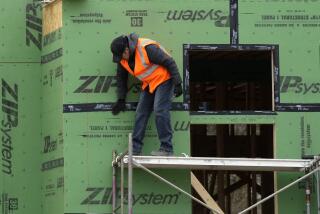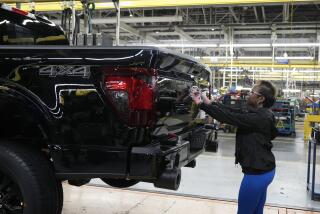Midwest factory activity slows; private employers add jobs
- Share via
Factory activity in the U.S. Midwest slowed just a bit in August and private employers continued to hire despite extreme financial market turmoil, easing fears the economy would fall back into recession.
Other data on Wednesday showed a strong rebound in demand for manufactured goods in July as orders for motor vehicles posted their largest gain since 2003, another suggestion a recession could be avoided despite some weak economic signals.
“For those of us who don’t believe the economy is in a free fall, we have got some support,” said David Resler, chief economist at Nomura Securities International in New York.
The Institute for Supply Management-Chicago said its business barometer fell to 56.5, the lowest since November 2009, from 58.8 in July. However, the reading was above economists’ expectations and indicated activity continued to grow.
A separate report from payroll processor ADP showed private employers added 91,000 net jobs in August after expanding payrolls by 114,000 in July.
The ADP figures come ahead of the U.S. government’s much more comprehensive labor market report Friday, which is expected to show a modest increase in employment, despite the damping effect of a strike at Verizon Communications Inc.
Although the ADP report has a poor track record of predicting non-farm employment, it offered hope that businesses had not pulled back sharply on hiring despite a big stock market sell-off and a loss of both business and consumer confidence.
Other data showed the number of planned layoffs at U.S. firms declined in August after rising for three months in a row, although the cuts were well above year-ago levels.
“The labor market is soft but not falling apart,” said Joel Naroff, chief economist at Naroff Economic Advisors in Holland, Pa. “The economy is not on the verge of a recession.”
The modest slowdown in Midwest factory activity suggested national manufacturing might not be cooling as fast as had been indicated by other regional surveys.
It also implied that forecasts that the Institute for Supply Management’s index of national manufacturing would fall to 48.5 in August from 50.9 in July might be overdone. The survey will be published Thursday.
A reading below 50 indicates a contraction, but economists say a reading of 48.5 would still be inconsistent with an overall recession.
Strong demand for motor vehicles helped lift orders for manufactured goods by 2.4% in July, the Commerce Department said. Factory orders had fallen 0.4% in June.
Orders for motor vehicles advanced 9.8%. That was the biggest gain since January 2003 and suggested that auto shortages caused by supply chain disruptions after the March earthquake in Japan were easing.
More to Read
Inside the business of entertainment
The Wide Shot brings you news, analysis and insights on everything from streaming wars to production — and what it all means for the future.
You may occasionally receive promotional content from the Los Angeles Times.










